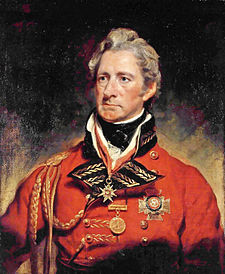Sir Thomas Munro
|
Major-General Sir Thomas Munro, Bt KCB |
|
|---|---|
 |
|
| Governor of Madras | |
|
In office 16 September 1814 – 10 July 1827 |
|
| Governor-General |
The Marquess of Hastings The Earl Amhurst |
| Preceded by | Sir George Barlow, Bt |
| Succeeded by | Stephen Rumbold Lushington |
| Personal details | |
| Born | 27 May 1761 Glasgow, Scotland |
| Died | 6 July 1827 (aged 65) Pattikonda, Madras Presidency, British India (now: Pattikonda, Kurnool district, Andhra Pradesh) |
| Nationality | British |
| Alma mater | University of Glasgow |
| Awards | KCB |
| Military service | |
| Allegiance |
|
| Service/branch | Madras Army |
| Years of service | 1779–1827 |
| Rank | Major-General |
| Battles/wars |
Second Anglo-Mysore War Third Anglo-Mysore War Third Anglo-Maratha War |
Major-general Sir Thomas Munro, 1st Baronet KCB (27 May 1761 – 6 July 1827) was a Scottish soldier and colonial administrator. He was an East India Company Army officer and statesman.
Munro was born in Glasgow on 27 May 1761 to a merchant called Alexander Munro. Thomas' grandfather was a tailor, who prospered by successful investments in American tobacco. After working as a bank clerk, Alexander Munro joined the family's prosperous tobacco business, but was ruined by the collapse of the tobacco trade during the American Revolutionary War. Thomas was also a direct descendant of George Munro, 10th Baron of Foulis (d.1452), chief of the Highland Clan Munro.
Thomas was educated at the University of Glasgow. While at school, Thomas was distinguished for a singular openness of temper, a mild and generous disposition, with great personal courage and presence of mind. Being naturally of a robust frame of body, he surpassed all his school-fellows in athletic exercises, and was particularly eminent as a boxer. He was at first intended to enter his father's business, but in 1779 was appointed to an infantry cadetship in Madras.
He served with his regiment during the hard-fought war against Haidar Ali (1780–1783), serving under his older and distant relation Major Sir Hector Munro, 8th of Novar. Thomas also later served alongside a younger distant relation John Munro, 9th of Teaninich. Thomas served again with his regiment in the first campaign against Tipu Sultan (1790–1792). He was then chosen as one of four military officers to administer the Baramahal, part of the territory acquired from Tipu, where he remained for seven years learning the principles of revenue survey and assessment which he afterwards applied throughout the presidency of Madras.
...
Wikipedia
